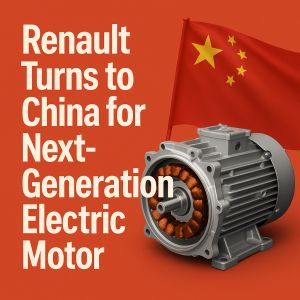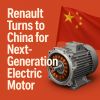Renault has decided to end its joint project with Valeo to develop a rare-earth-free electric vehicle motor and is now seeking a lower-cost Chinese supplier to help drive its next generation of EVs.
The move highlights the growing dominance of Chinese technology and manufacturing in the global electric vehicle industry. As the cost of electrification continues to pressure European automakers, China’s scale, speed, and affordability have become increasingly attractive.
Renault’s new motor, internally known as the E7A, was initially being developed in partnership with Valeo as part of a plan to design a more compact, more powerful motor without rare earth materials. The project will now be managed entirely within Renault, with the exception of the stator, which may be sourced from a Chinese manufacturer.
This shift marks another step in Europe’s quiet reliance on Chinese suppliers for critical EV components. Chinese companies currently lead the world in battery technology, magnet-free motor design, and cost-efficient production — advantages that have proven difficult for European firms to match.
Renault is expected to keep final assembly of the motor in France, at its Cleon plant, while still integrating Chinese-made parts. The motor will use advanced silicon carbide modules from STMicroelectronics and deliver around 200 kW of power, a 25% improvement over current Renault electric models.
The French automaker has increasingly turned to China for engineering expertise. A Chinese development team played a key role in designing the new electric Twingo, reducing its production timeline to just two years.
The upcoming E7A motor will power Renault’s next generation of compact EVs starting in 2028, a central part of its long-term electrification strategy. With China’s influence continuing to expand across the EV supply chain, Renault’s decision signals how deeply interlinked European automakers have become with Chinese innovation — not just for batteries, but now for core powertrain technology.





